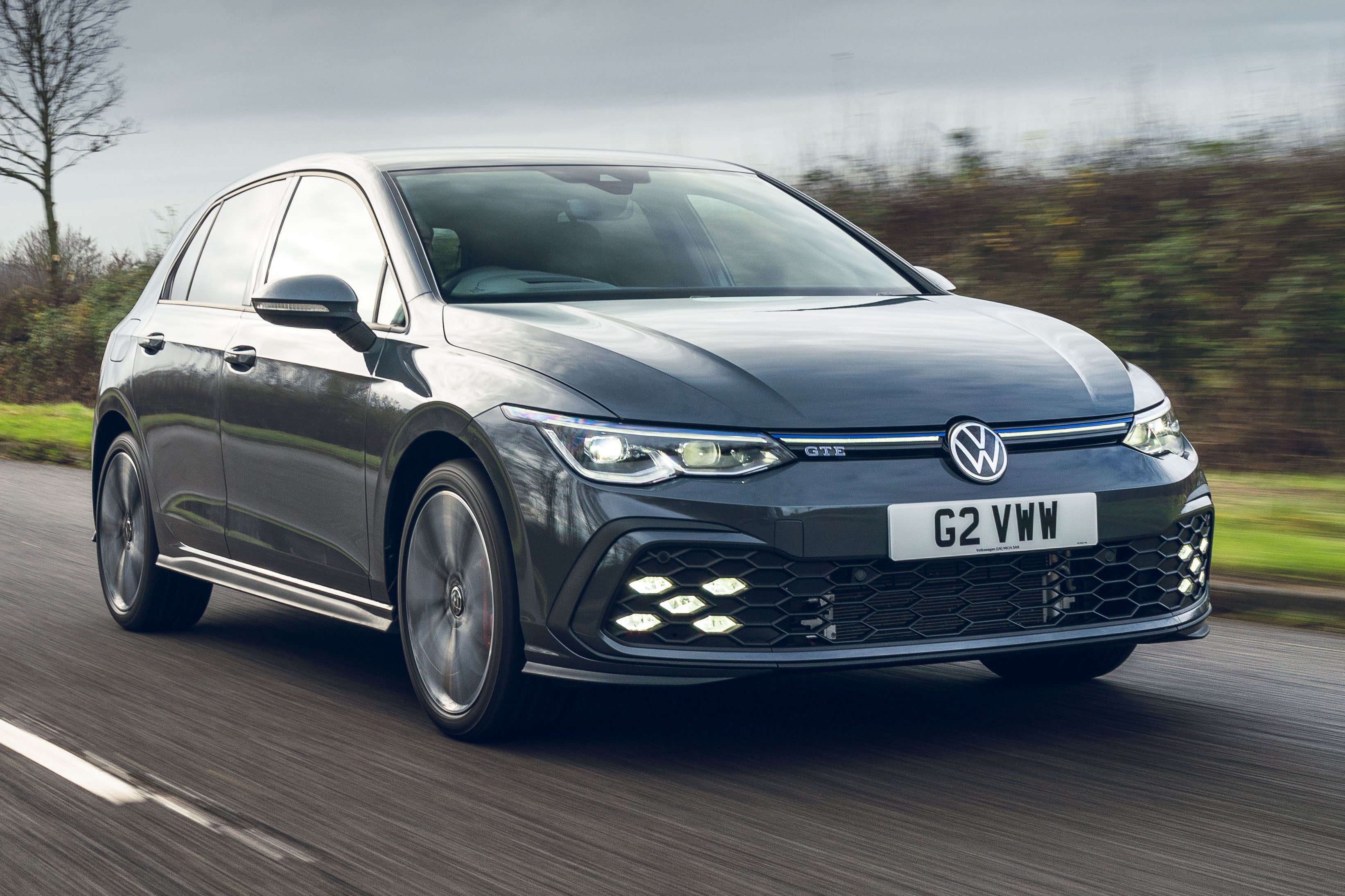Volkswagen Golf GTE Review 2025: Price, specs & boot space
Written by Richard Aucock
Quick overview
Pros
- More power than a Golf GTI
- Generous standard specification
- Low company car tax costs
Cons
- Batteries reduce boot capacity
- Fiddly infotainment system
- A Golf GTI is more fun to drive
Verdict: Is the Volkswagen Golf GTE a good car?
“The Volkswagen Golf GTE is the eco-alternative to the legendary Golf GTI, with plug-in hybrid power and sporty styling included. Whether it is to keep your fleet manager happy, or to help your own bank balance, the Golf GTE comes close to proving you can have your cake and eat it.”
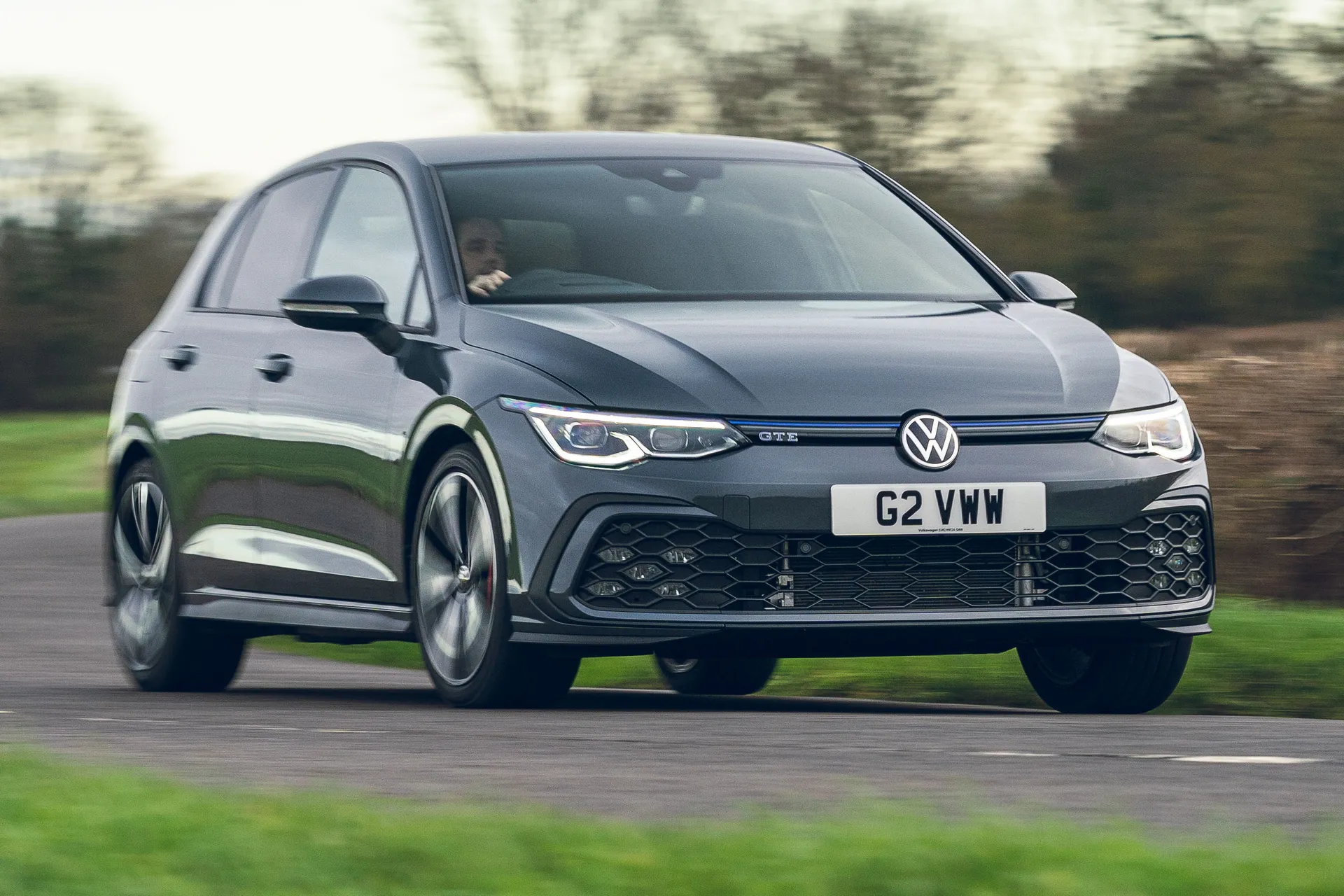
The Volkswagen Golf GTI is an iconic vehicle, being one of the very first hot hatchbacks ever created. The passage of time has seen it adapted to meet changing trends, including spin-off versions such as the recent diesel-powered Golf GTD and plug-in hybrid Golf GTE.
Now into its second generation, the Volkswagen Golf GTE aims to blend hot hatchback performance with the level of efficiency and fuel economy that a plug-in hybrid can deliver. Put this in the context of using the Volkswagen Golf as a base, and it creates quite the combination. The package is very similar to rival options, such as the larger (and cheaper) Skoda Octavia vRS iV or the Cupra Leon eHybrid, though.
The Golf GTE boasts impressive fuel economy figures of nearly 800mpg, and comes with very low running costs as a result. Company car drivers in particular will be fans, thanks to a very low 6 percent Benefit-in-Kind tax rating.
Is the Volkswagen Golf GTE perfect? Not quite. The lithium-ion batteries for the hybrid powertrain eat into boot capacity, and some will find the GTE isn’t as engaging as they demand from a hot hatchback. Blame the extra weight of those batteries.
However, these are relatively modest issues in the grand scheme of things, with the Volkswagen Golf GTE an appealing all-round option.
Being able to travel more than 80 miles on battery power alone, accelerate from 0-62mph in less than seven seconds, and transport four adults in comfort is a considerable feat for any car.
Prices for the latest Volkswagen Golf GTE start at less than £20,000 on the used market, with the previous 2015-2020 version available from only around £12,000.
Looking for a used car for sale? We've got 100s of Volkswagen Approved Used Cars for Sale for you to choose from, including a wide range of VW Golf GTE models for sale.
Is the Volkswagen Golf GTE right for you?
Like the regular Volkswagen Golf on which the GTE is based, it does many things well. This means that the Volkswagen Golf GTE suits those who want a more eco-friendly hot hatchback, or drivers looking to keep costs down when it comes to the company car tax bill.
The Volkswagen Golf GTE is not perfect, with the infotainment system a notable nuisance on first use. Familiarity will make it easier to operate, but there is still the feeling it could be more user-friendly.
It is easy to recommend the rest of the Volkswagen Golf GTE, though, thanks to its strong performance and generous level of standard equipment. Yes, a Volkswagen Golf GTI will be a little more engaging on the right road, but a Golf GTI cannot travel 80 miles on electric power alone, and since a manual gearbox is no longer offered in the GTI, you’re not missing that in the GTE either.
What other cars are similar to the Volkswagen Golf GTE?
The Volkswagen Golf GTE has a number of immediate close relatives from within the Volkswagen Group, such as the Skoda Octavia vRS iV and Cupra Leon eHybrid, along with the Audi A3 45 TFSI e.
All of these models bring the same plug-in hybrid powertrain to the party, but each adds their own unique take on proceedings. The Skoda has more cabin space, the Cupra a sportier image and the Audi a premium interior design.
The petrol-powered Volkswagen Golf GTI is the obvious option for a hot hatchback without a plug-in hybrid engine, and while it’s no longer available new, the diesel-powered Golf GTD can deliver long-range cruising efficiency.
Stepping outside the Volkswagen Group opens the door to alternatives such as the Mercedes-Benz A250e, which also uses a plug-in hybrid drivetrain.
Comfort and design: Volkswagen Golf GTE interior
“The Volkswagen Golf GTE has a premium-looking interior, with added sporty touches such as blue tartan upholstery. A steering wheel taken from the Golf GTI adds to the performance image.”
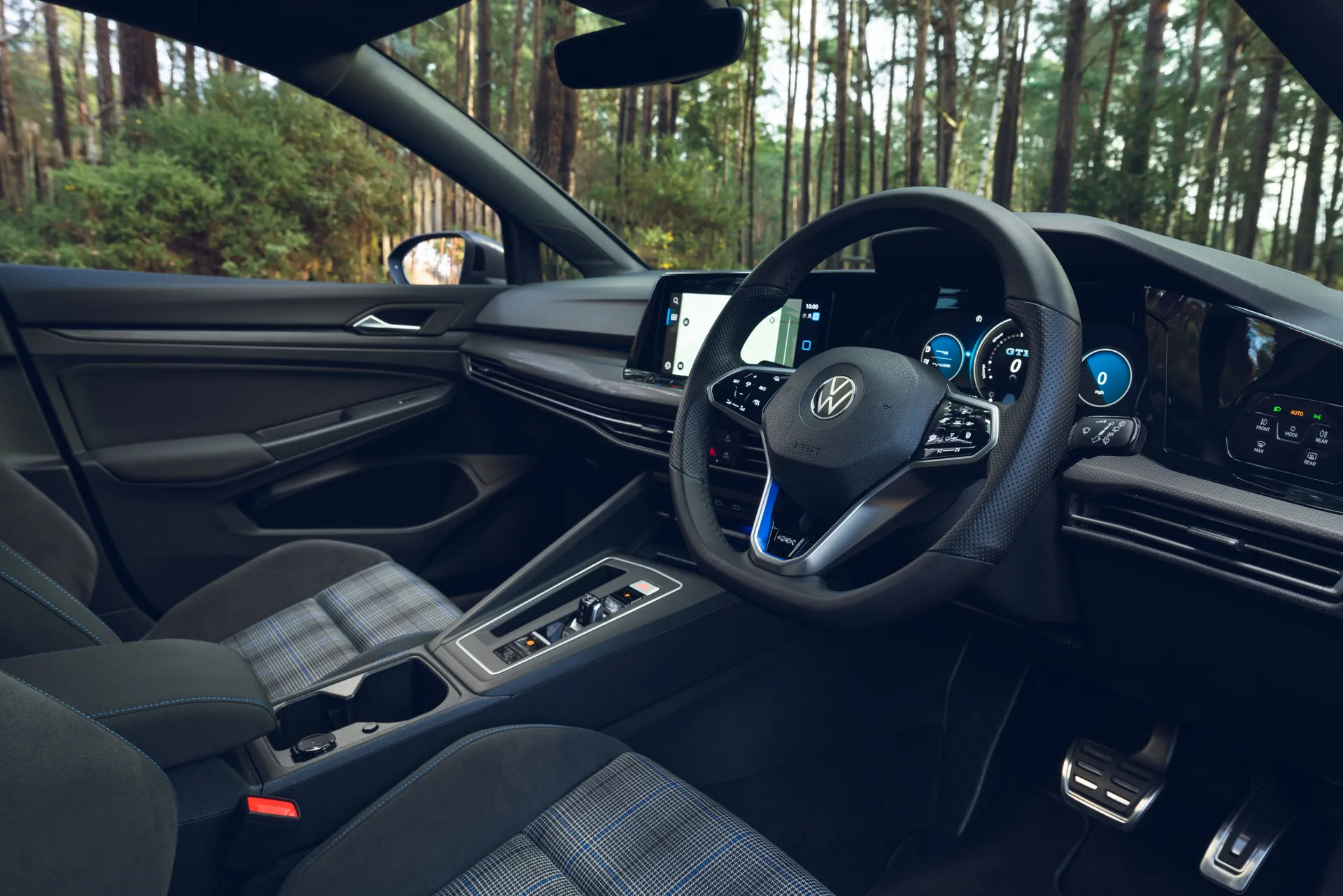
As with the regular Volkswagen Golf, the GTE boasts a minimalist cabin design, with only a handful of touch-sensitive buttons remaining. For those used to a more traditional layout, with physical dials and switches to operate the climate control, for instance, the Golf GTE’s cabin can feel something of a shock at first.
Almost every interior function is operated through the high-definition 12.9-inch infotainment touchscreen (10 inches prior to the 2024 updates), save for the headlights and a smattering of shortcut buttons on the dashboard. Volkswagen has fitted touch-sensitive sliders to control the interior temperature, for which VW finally added backlighting in 2024’s update.
To ensure the Golf GTE stands out from lesser models, Volkswagen has given it blue ‘Jacara’ tartan upholstery. This is a deliberate nod to the red tartan found in the current Golf GTI, itself a homage to the very first version of Volkswagen’s iconic hot hatch. It does a good job of lifting an otherwise sombre cabin, as does the LED ambient lighting and sports steering wheel.
Along with looking good, the tartan-look sports seats are also comfortable, with plenty of adjustment included. They grip in all the right places, and help reinforce the performance aesthetic.
Quality and finish
Volkswagen used to be the benchmark for interior quality, but the rest of the automotive world has spent time playing catch-up. There has clearly been an element of cost-cutting by Volkswagen, too, which means some materials won’t match with the £40,000 price tag.
As such, the Golf GTE is more mid-pack than class leader on perceived quality, and on a par with rivals like the Skoda Octavia vRS and Cupra Leon. There is no denying the Golf GTE is more upmarket than mainstream models such as the Ford Focus or Vauxhall Astra, but an Audi A3 or Mercedes-Benz A-Class feels a touch more premium.
That is not to say the Volkswagen Golf GTE seems cheap inside. Features such as LED ambient lighting help lift the overall cabin experience, and the doors still close with reassuring solidity. Blue tartan upholstery, a play on the red trim found in the Golf GTI, is another interior highlight.
Infotainment: Touchscreen, USB, sat nav and stereo in the Volkswagen Golf GTE
One of the most noticeable aspects of the Volkswagen Golf GTE’s cabin is the near-complete absence of buttons and switches. Instead, Volkswagen has focussed on almost every function being controlled by the 12.9-inch infotainment touchscreen, with only a handful of shortcut buttons on the actual dashboard.
For anyone used to traditional dials and switches, the Golf GTE’s interior may be an initial shock, and take some adjusting to. Familiarity will make it easier to live with, but there is a feeling that adding just a few more buttons would have produced an infotainment system that was seamless to operate. Updates to the operating system itself have made it better, but there are still lots of menus to navigate.
The Volkswagen Golf GTE uses a version of the steering wheel found in the Golf GTI, albeit with blue stitching for the leather instead of red. Prior to 2024, these were haptic, but VW wisely changed them back to physical buttons when the car was facelifted, and they’re much easier to operate now (and you’re less likely to accidentally brush one and change your volume or other functions) as a result.
Standard infotainment features include DAB radio, satellite navigation, Bluetooth and wireless smartphone charging. Both Apple CarPlay and Android Auto smartphone connectivity are included, too, should you wish to sidestep Volkswagen’s own infotainment.
Space and practicality: Volkswagen Golf GTE boot space
Being based upon the regular Volkswagen Golf – arguably the archetypal family hatchback – the GTE delivers exactly the same amount of space for passengers.
As a result, nobody should feel uncomfortable in the front of the Golf GTE, thanks in part to the standard sports seats. These offer plenty of adjustability, with figure-hugging bolsters to hold you in place. Combined with a steering wheel that is adjustable for both reach and rake, there should be no complaints from the driver. Overall room up-front is generous, with useful storage cubbies and large door pockets.
Space in the back is a little tighter, especially compared to close rivals like the Skoda Octavia vRS iV or Cupra Leon eHybrid. Legroom is still reasonable, and there is a lot of headroom, but the rear seats are best suited to just two adults – and only three adults for occasional use.
The only real downside when it comes to the Golf GTE is boot space. A petrol-powered Volkswagen Golf GTI can accommodate up to 374 litres of luggage in the boot, but the Golf GTE needs space to store its lithium-ion battery pack.
As a result, the capacity is 273 litres with the rear seats up, which is still usable for a family hatchback. However, the Skoda Octavia vRS iV and Cupra Leon eHybrid are more generous.
Handling and ride quality: What is the Volkswagen Golf GTE like to drive?
“Composed and surefooted, the Volkswagen Golf GTE is an effective cross-country cruiser. It might lack the ultimate hot hatch cutting edge, but it is far more usable as a result.”
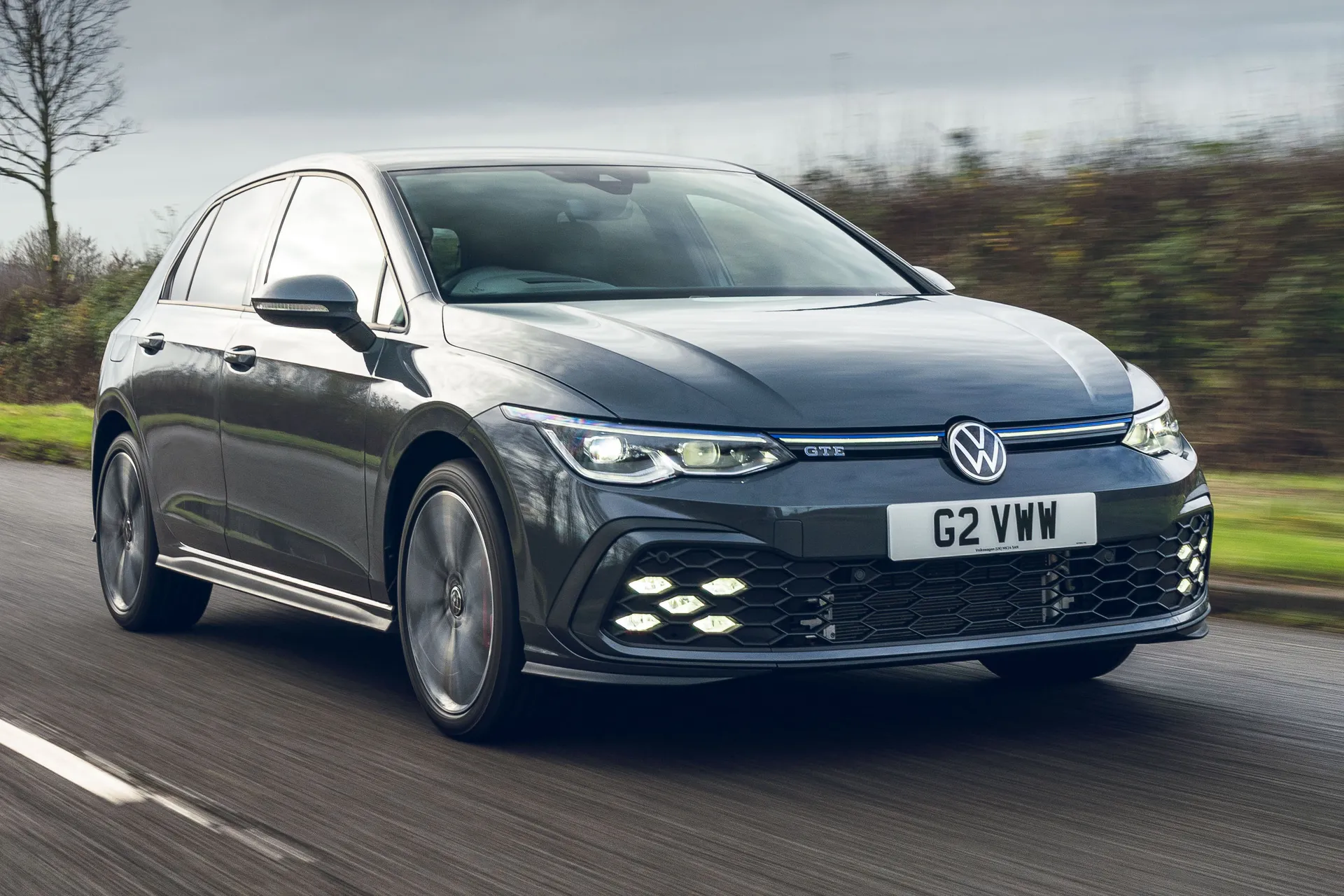
When it comes to assessing how the Volkswagen Golf GTE drives, it is important to remember this is still an eco-conscious plug-in hybrid at heart. The result is a car well-suited to long-distance journeys, delivering effortless performance, if not outright thrills.
What limits the ability of the Golf GTE is a kerb weight in excess of 1,600kg, thanks to its lithium-ion battery pack. This is quite a lot of weight for a relatively compact hatchback, and means it can never truly feel as engaging as the petrol-powered Golf GTI.
Volkswagen fits the Golf GTE with its ‘Progressive Steering’ setup, which reduces the amount of arm-twirling needed at parking speeds. On the road, it helps make the Golf GTE quick to react, inspiring confidence when cornering. It does not offer much in the way of feedback, though, but this is unlikely to be a major concern for most buyers.
As a sportier model, the Golf GTE comes with a firmer suspension setup than a regular Golf. This manages to avoid being uncomfortable, especially with the standard 17-inch alloy wheels, adding to the car’s mile-munching ability. The optional Dynamic Chassis Control allows the suspension stiffness to be adjusted between multiple settings, and is a useful option to have.
What engines and gearboxes are available in the Volkswagen Golf GTE?
There is just one engine and gearbox combination available for the Volkswagen Golf GTE, meaning there are no options to worry about in this area.
All versions combine a turbocharged 1.4-litre four-cylinder petrol engine with an electric motor. For 2020-2024 models, the result is a total of 245PS, along with a substantial 400Nm of torque. With the updated models from 2024 on, that climbs to 272PS, actually more than the 265PS you get from a standard Golf GTI.
The instant torque from this motor makes the Golf GTE feel quick to react, and helps deliver a 0-62mph time of 6.7 seconds in earlier cars, and 6.6 for the later, more powerful models. This is a little down on the 5.9-second Golf GTI, but quicker than the old diesel Golf GTD. A quick-shifting six-speed DSG dual-clutch automatic transmission is the only gearbox available, and aids straight-line performance.
All of the Golf GTE’s power goes to the front wheels, which can see the traction control light flashing if you get carried away when exiting a junction.
Refinement and noise levels
Just like the regular Volkswagen Golf, the GTE manages to deliver the upmarket level of refinement that you expect. Road and wind noise are well managed, especially on the motorway, adding to the long-distance cruising ability of the Golf GTE.
Noise from the 1.4-litre petrol engine is unobtrusive, without any elaborate pops and crackles from the exhaust system, despite the car’s hot hatch image. The combined torque of the plug-in hybrid drivetrain makes for an unflustered driving experience.
Naturally, when driving in electric-only mode, the Golf GTE is very quiet indeed. The Golf GTE also handles switching between petrol and battery power effectively, unlike some plug-in hybrid competitors.
Safety equipment: How safe is the Volkswagen Golf GTE?
When the regular Volkswagen Golf was crash tested by Euro NCAP in 2019, it received a maximum five-star safety rating. It scored an impressive 95% for adult occupants and 89% for children. This means the Golf GTE should be just as safe, especially with all its standard safety technology.
Adaptive cruise control is included, and comes with a speed limiter function and the ability to spot potential front-on collisions with other vehicles, pedestrians and cyclists.
Other features include lane-keeping assist, dynamic road sign display and parking sensors both front and rear. There is even Volkswagen’s Car2X wireless communication system, which can relay information from other vehicles to warn of impending hazards ahead.
You also get numerous airbags and Isofix child seat attachment points on the two outer rear seats, plus on the front passenger seat.
MPG and fuel costs: What does a Volkswagen Golf GTE cost to run?
“The Volkswagen Golf GTE exists to deliver a combination of performance and cost savings. The plug-in hybrid drivetrain does not disappoint, and company car drivers will be very happy indeed.”
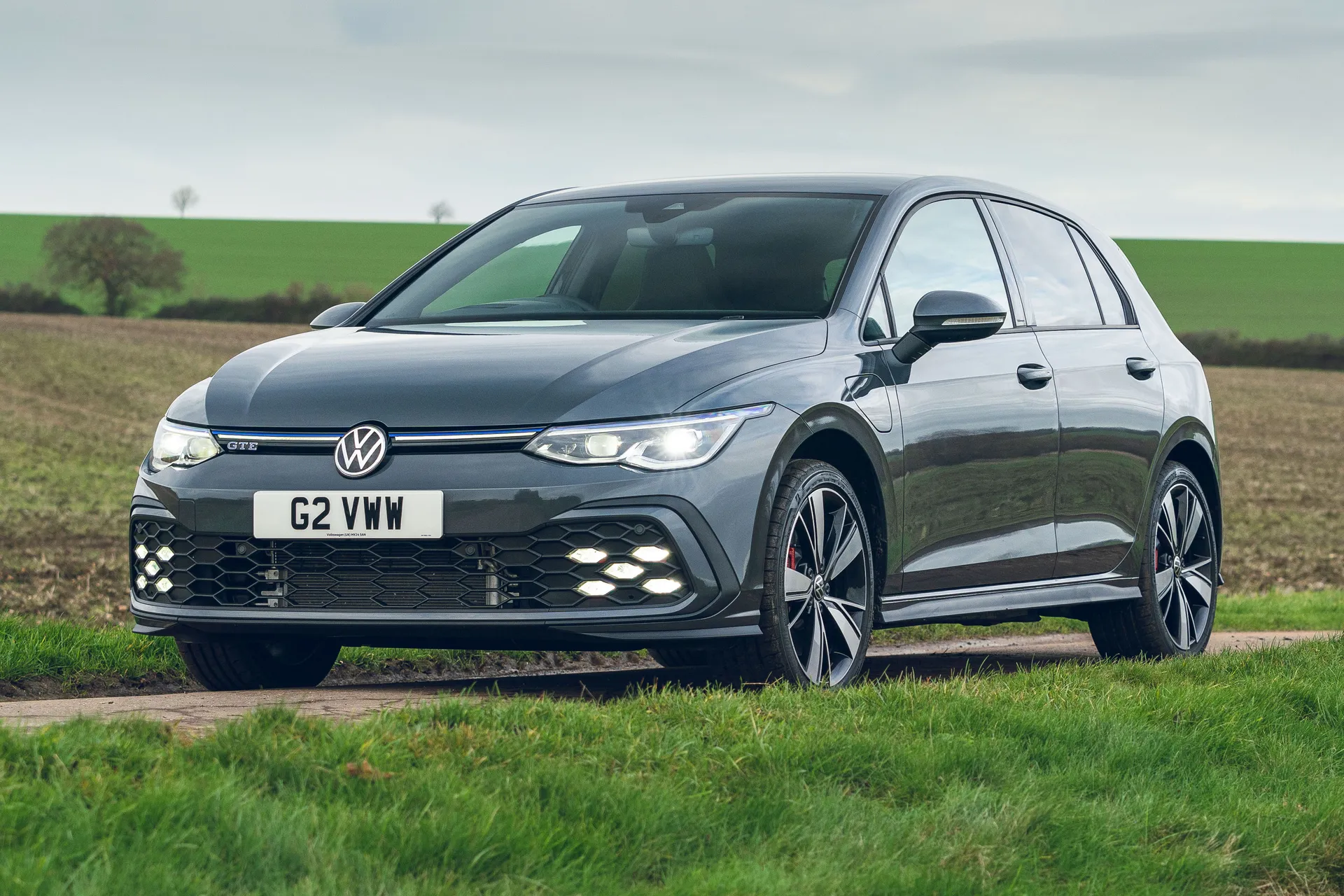
The Volkswagen Golf GTE was launched with an impressive combined fuel economy figure of 235.4mpg, thanks to its plug-in hybrid system and EV range of 37 miles. In 2024, Volkswagen updated the Golf GTE with a much larger battery pack (19.4kWh to the previous car’s 13.6kWh), which has boosted the EV range to one of the best on the market in a plug-in hybrid, at 81 miles.
So while you should take the new 795.6mpg combined economy rating with a grain of salt (as to nail that number you’d have to drive basically exactly as they do in official economy testing, and run the car primarily on electric power), the bottom line is you now have twice the EV range as before, so a significant proportion of your driving could now be EV-only, and economy figures will be that much better; and the outgoing car was already capable of real-world average economy in the 60mpg range.
Benefit in Kind taxation for company users is very friendly towards GTE owners too. Low CO2 and a whopping 81 miles of EV range makes it one of the most cost-effective cars this side of a full EV, with BiK of just 6% (compared to 3% for an electric car).
Volkswagen Golf GTE reliability and warranty
Volkswagen typically has a strong reputation for reliability, but the results of the latest Honest John Satisfaction Survey show more of a mixed bag. Older models dragged the marque’s score down, but later cars performed better.
The Volkswagen Golf GTE does come with a three-year or 60,000-mile warranty (whichever comes first) as standard. This is fairly typical of premium European marques, and should offer enough peace of mind for most owners.
Volkswagen Golf GTE insurance groups and costs
Given the level of complexity and performance on offer, the Volkswagen Golf GTE will be more expensive to insure than a regular family hatchback. At the time of writing, the Golf GTE has been placed in insurance group 27, whereas the normal Volkswagen Golf range tops out at group 24.
The group 27 rating for the Golf GTE is still lower than the group 28 applied to the petrol Volkswagen Golf GTI, though. An equivalent Skoda Octavia vRS iV will be cheaper, however, with a group 25 insurance rating.
VED car tax: What is the annual road tax on a Volkswagen Golf GTE?
The key selling point for the Volkswagen Golf GTE is the low emissions achieved by its plug-in hybrid drivetrain. Unfortunately while the GTE’s emissions have dropped from an already low 27g/km to 8g/km with recent updates, a change in the UK’s VED rates means you’ll still pay more in year one to tax it, at £110 (compared to the previous £10). From year two onwards you’ll pay £195, plus a surcharge for five years because it costs over £40,000 new, bringing your bill to £620 a year.
Volkswagen Golf GTE price
“Having been on sale for a few years, there is a good selection of used Volkswagen Golf GTE models around to choose from. A budget of less than £20,000 could see you behind the wheel of a Golf GTE from one of heycar’s trusted dealers.”
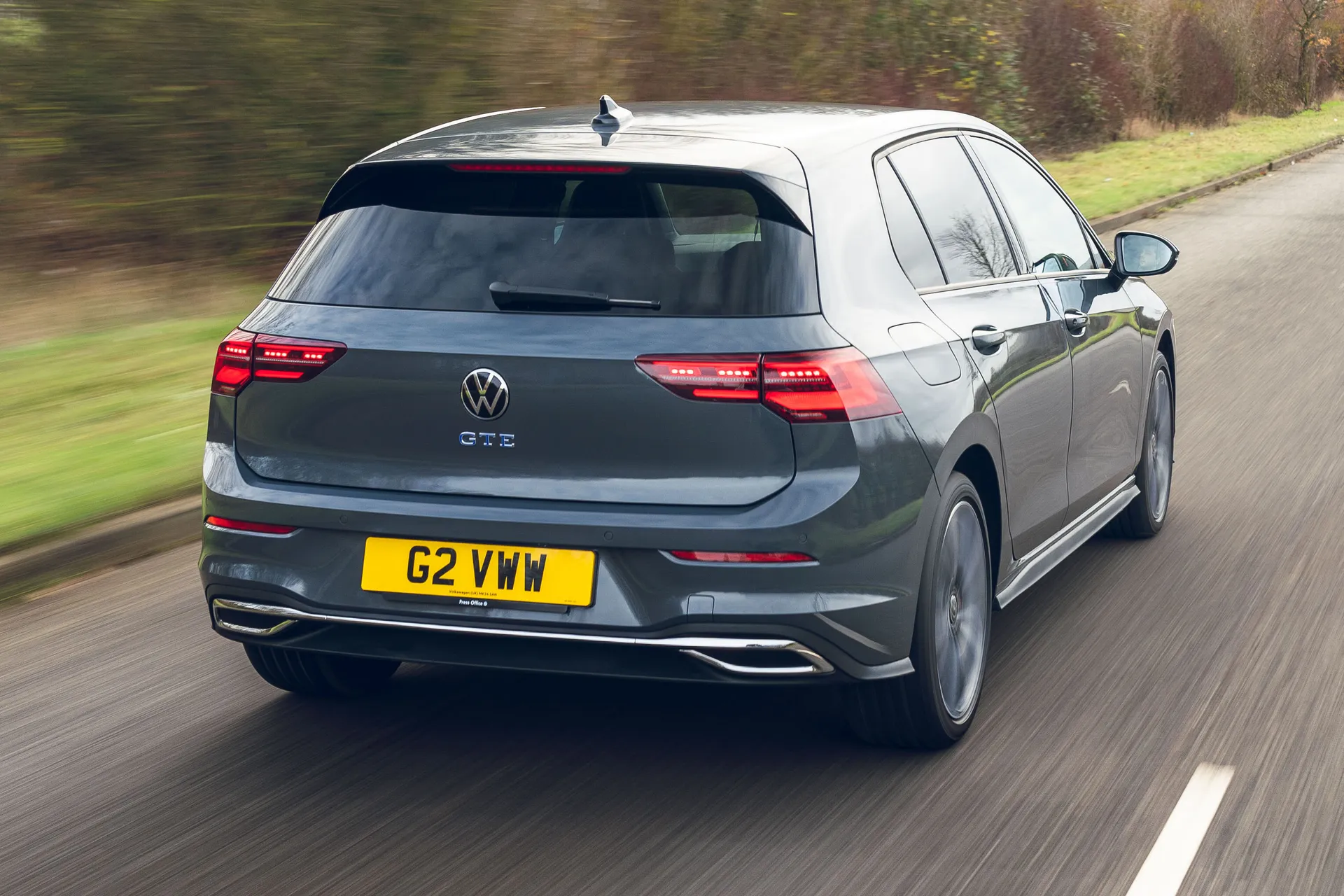
With the Volkswagen Golf GTE coming in just one trim level and engine combination, there is less to worry about when comparing prices.
The very earliest examples of the current Golf GTE start from less than £20,000 for a 2020 or 2021 car with typically 40-50,000 miles on the clock. If you’d prefer something slightly newer then there are still savings to be made; as of spring 2025, 2024 cars with only a couple of thousand miles are around for under £30,000.
This undercuts the new list price for a Volkswagen Golf GTE, which now costs £40,140 without any options fitted. That, incidentally, is around £600 cheaper than a Golf GTI.
Trim levels and standard equipment
The Volkswagen Golf GTE comes in just one trim level, but the German manufacturer has been particularly generous with the amount of equipment fitted as standard.
Being one of the Volkswagen Golf’s performance variants, the GTE builds upon the well-equipped Golf R-Line, and shares a number of features seen on the Golf GTI and the now-departed diesel Golf GTD.
These include a performance bodykit, tailored for the Golf GTE with honeycomb detailing and blue trim used above the front grille and standard ‘IQ. Light’ adaptive LED headlights. There is also plenty of GTE badging and blue highlights, ensuring everyone knows you plumped for the plug-in hybrid.
LEDs are used for the tail lights, which come with dynamic indicator animation, while the LED front fog lights are in a honeycomb pattern. There is even an illuminated front grille.
The Golf GTE comes with 17-inch ‘Richmond’ alloy wheels as standard, with 18-inch ‘Bakersfield’ items on the options list. These add £650 to the new price of a Golf GTE, and also have the effect of increasing fuel consumption and CO2 emissions.
Regardless of wheel size, all Golf GTEs come with sporty red-painted brake callipers.
Blue ‘Jacara’ tartan trim covers the sports seats found inside the Golf GTE, while there is also a leather-wrapped sports steering with blue stitching. A black headlining, GTE-branded gear selector and ‘black metal chrome’ trim are other sporty additions.
Three-zone climate control, keyless entry, ambient LED lighting and front and rear parking sensors are all fitted as standard. The 10.0-inch multimedia touchscreen is complemented by a 10.25-inch digital instrument panel, with satellite navigation and DAB radio included.
Ask the heycar experts: common questions
How far can the Volkswagen Golf GTE go on battery power?
How long does the Volkswagen Golf GTE take to charge?
Is the Volkswagen Golf GTE fun to drive?
Get our latest advice, news and offers
Keep me updated by email with the latest advice, news and offers from heycar.
By submitting you agree to our privacy policy
